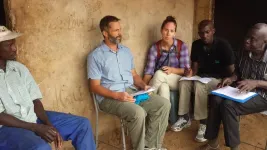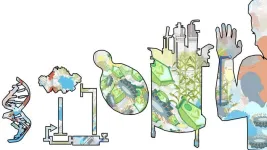(Press-News.org) A lower level of mental ability during the teenage years may be linked to as much as a tripling in the risk of having a stroke before the age of 50, finds research published online in the Journal of Epidemiology & Community Health.
The observed associations held true even after factoring in current diabetes and limiting the age of a first stroke up to 40, prompting the researchers to suggest that more comprehensive assessments beyond traditional stroke risk factors are now needed to stave off disability and death.
Recent evidence suggests that cases of stroke among the under 50s years are on the rise. And around half of all stroke survivors can expect to live with long term physical and psychological impairments, say the researchers.
Lower levels of mental ability in childhood and adolescence—to include powers of concentration, problem solving, and learning—have been associated with higher risks of future cardiovascular and metabolic diseases. But the findings are inconsistent, note the researchers.
To strengthen the evidence base, they wanted to find out if mental ability in adolescence might be associated with a heightened risk of early onset stroke in a nationally representative sample of 1.7 million young Israelis.
Before starting military service, 16-20 year old Israelis undergo extensive evaluation to assess their suitability, and this study includes all those assessed between 1987 and 2012.
As well as weight, blood pressure, current diabetes, other factors assessed included educational attainment, socioeconomic background, and mental ability.
This last includes tests to measure the ability to understand and carry out verbal instructions; verbal abstraction and categorisation (word grouping); mathematical ability, concentration, and conceptual thinking; non-verbal abstract reasoning and visual-spatial problem solving.
The study participants’ results were then linked to the Israeli national stroke database, for which mandatory reporting only began in 2014, up until the end of 2018, the first recorded stroke, or death, whichever came first.
The final analysis is based on 1,741,345 people, 738,720 (42%) of whom were women. Out of the total, 12% (312,769) were scored as having a high level of mental ability, 70% (1,220,514) as having a medium level, and 18% (208.062) as having a low level.
Compared with those whose scores indicated a high level of mental ability, those at the other end of the scale were more likely to be overweight or obese (17% vs 12%), less likely to have completed secondary school education (82% vs 99%), and more likely to have lived in a socially and economically deprived neighbourhood (35% vs 19%)--all risk factors for cardiovascular disease.
Between 2014 and 2018, 908 cases of stroke were recorded, of which 767 were caused by a blood clot (ischaemic) and 141 by a bleed on the brain (intracerebral haemorrhage).
The average age of a first stroke was 39.5 (maximum age 50). And 45 people died as a result (5% of all stroke cases), nearly two thirds of whom (62%) did so within 30 days of the event.
Among those scoring low to medium on mental ability, the incidence of both types of stroke was higher, particularly that of ischaemic stroke.
After accounting for potentially influential factors, those with low mental ability were more than 2.5 times as likely to have a stroke before the age of 50 as those with a high level, while those with a medium level were 78% more likely to do so.
Of the 767 cases of ischaemic stroke, 311 (41%) occurred before the age of 40. After accounting for potentially influential factors this risk was almost double (96% higher) among those with a medium level of mental ability and more than 3 times higher among those with a low level in their teenage years.
Heightened risk rose in tandem with the mental ability score, such that for every 1 unit decrease in the score (scale of 1 to 9), the risk rose by 33%. However, when the analysis was based on categories of mental ability alone, no such associations emerged for a stroke involving a bleed on the brain.
These associations held true even after further in-depth analyses, including factoring in current diabetes and limiting the age of first stroke up to the age of 40.
This is an observational study, and therefore can’t establish cause and effect. The researchers also acknowledge various limitations to their findings, including the lack of information on lifestyle, such as smoking, physical activity, and diet; higher education; and several potentially important social determinants of health.
But they write: “Without risk factor intervention in early adulthood, stroke risk accumulates.” And they conclude: “Cognitive function may serve as a means of stratifying individuals at greater risk for stroke and for intervention via possible mediators such as health illiteracy, education, and health-related behaviours. Provision of early social and health support for individuals with lower cognitive function might be essential for mitigating their elevated risk.”
END
Poorer teen mental ability linked to as much as tripling in stroke risk before age of 50
Associations held after factoring in diabetes and limiting age of first stroke up to 40. Assessments beyond traditional stroke risk factors now needed, suggest researchers
2024-06-28
ELSE PRESS RELEASES FROM THIS DATE:
Adults conceived by donors left behind by fertility industry
2024-06-28
Children conceived by using egg or sperm donors have the same well-being outcomes as non-donor conceived people.
However, they are more likely to have identity difficulties and issues with trust. Secrecy and anonymity about their genetic parentage can have a profound impact on well-being say authors. They warn that children and adults conceived using donor gametes have not been centred in the assisted reproductive industry and more information is needed about adult wellbeing.
The study is published today in the British Journal of Obstetrics and Gynaecology by researchers King’s College London. The study is the first systematic ...
Novel method optimizes extraction of antioxidant and colorant from jabuticaba peel
2024-06-28
Scientists at the State University of Campinas (UNICAMP) in Brazil and the University of Cadiz (UCA) in Spain have successfully deployed a novel method of extracting high-value-added chemical compounds from the peel of jabuticaba (Plinia cauliflora). The method, which simplifies the process and enhances its efficiency, is described in an article published in Journal of Food Composition and Analysis.
The aim was to optimize extraction of anthocyanin, a potent antioxidant found in strawberries, blackberries and raspberries as well as jabuticabas, among other sources. It has anti-inflammatory effects and is also a natural ...
Researchers discover how nerve cells in bat brains respond to their environment and social interactions with other bats
2024-06-28
Vienna, Austria: Researchers have found that nerve cells in the hippocampus region of the brain encode complex information on numerous characteristics of other individuals in the same social group.
The work, which is being carried out in bats, is the first to show this in a large, mixed-sex group of wild, social animals, and is important because it sheds light on how the brain operates and generates thinking processes and behaviour.
Professor Nachum Ulanovsky, Head of the Center for Learning, Memory and Cognition at the Weizmann Institute of Science, ...
Simulating blood flow dynamics for improved nanoparticle drug delivery
2024-06-27
Despite gaining a bad rap in mainstream media in recent years, nanoparticles have been successfully used for decades in targeted drug delivery systems. Drug molecules can be encapsulated within biodegradable nanoparticles to be delivered to specific cells or diseased tissues. However, blood flow dynamics can significantly affect the nanoparticle’s ability to bind at the target site and stay adhered long enough for the drug to be released.
Drawing inspiration from civil, mechanical, electrical and chemical engineering, University of Illinois Urbana-Champaign professors Arif Masud and Hyunjoon Kong have developed and tested a new mathematical model to accurately simulate ...
Research and efforts to combat schistosomiasis earn geographer David López-Carr several high-profile awards
2024-06-27
(Santa Barbara, Calif.) — What if you could take an ecologically degraded environment that presents a public health problem, and devise a powerful and elegant solution that not only restores its functionality but also reduces its health impacts while addressing food and water access and alleviating poverty? An international team of biologists, social scientists and medical researchers in the U.S. and Senegal did just that, and for their innovation and research, published in the journal Nature, has received several prestigious awards.
“It feels gratifying to be recognized for work finding win-win solutions for the environment and people,” said UC Santa ...
US states shape foreign policy amid national China unease, research shows
2024-06-27
State-level officials such as governors, state legislators and attorneys general are shaping U.S.-China relations as the two countries navigate a strained geopolitical relationship, according to new research by political scientist Kyle Jaros.
“The state level has independent importance in the U.S.-China relationship — it’s not just a reflection of what’s happening at the national level,” said Jaros, associate professor of global affairs in the Keough School of Global Affairs at the University of Notre Dame. “The actions taken by state and local officials — and their Chinese counterparts — not only affect their own communities, ...
Midwest Center for AIDS Research to help end regional HIV epidemic
2024-06-27
Since the peak of the AIDS epidemic, the U.S. has achieved significant advancements in preventing and treating HIV, though progress has been uneven across regions and slower than necessary. In Missouri, where the number of new HIV diagnoses and deaths has not improved since 2017, there is a need to recapture momentum in addressing the disease.
In a bid to jump-start the stalled campaign against HIV in the region, researchers at Washington University School of Medicine in St. Louis and Saint Louis University plan to establish the Midwest Developmental Center for AIDS Research with funding from the National ...
WIC enrollment reduces poor pregnancy outcomes for parents and babies, study finds
2024-06-27
More than one in 10 households in the United States last year did not have access to adequate and nutritious food, according to the U.S. government. Further, food and nutrition insecurity lead to a higher risk of poor pregnancy outcomes.
The U.S. Special Supplemental Nutrition Program for Women, Infants and Children (WIC) is one of the main federal food assistance programs that aims to reduce food insecurity for eligible pregnant, postpartum and breastfeeding people and their children. WIC helps improve the health of participants and their families by providing access to food, nutrition education, and referrals ...
Northwestern researchers propose a new, holistic way to teach synthetic biology
2024-06-27
The field of synthetic biology, the science of manipulating biology, has a lot of “cooks in the kitchen,” which has both helped it flourish and made it unusually difficult to create a cohesive, consistent curriculum for students at every level of study. Each discipline involved — from chemical engineering to ethics — has a unique approach to teaching and literature, which creates inconsistencies between what scientists learn.
Now, Northwestern University researchers propose a new way to teach synthetic biology that uses different levels of organization — starting at the molecular scale and growing ...
Is ChatGPT the key to stopping deepfakes? Study asks LLMs to spot AI-generated images
2024-06-27
BUFFALO, N.Y. — When most people think of artificial intelligence, they’re probably thinking of — and worrying about — ChatGPT and deepfakes. AI-generated text and images dominate our social media feeds and the other websites we visit, sometimes without us knowing it, and are often used to spread unreliable and misleading information.
But what if text-generating models like ChatGPT could actually spot deepfake images?
A University at Buffalo-led research team has applied large language models (LLMs), including OpenAI’s ChatGPT and Google’s Gemini, toward spotting deepfakes of ...
LAST 30 PRESS RELEASES:
Alkali cation effects in electrochemical carbon dioxide reduction
Test platforms for charging wireless cars now fit on a bench
$3 million NIH grant funds national study of Medicare Advantage’s benefit expansion into social supports
Amplified Sciences achieves CAP accreditation for cutting-edge diagnostic lab
Fred Hutch announces 12 recipients of the annual Harold M. Weintraub Graduate Student Award
Native forest litter helps rebuild soil life in post-mining landscapes
Mountain soils in arid regions may emit more greenhouse gas as climate shifts, new study finds
Pairing biochar with other soil amendments could unlock stronger gains in soil health
Why do we get a skip in our step when we’re happy? Thank dopamine
UC Irvine scientists uncover cellular mechanism behind muscle repair
Platform to map living brain noninvasively takes next big step
Stress-testing the Cascadia Subduction Zone reveals variability that could impact how earthquakes spread
We may be underestimating the true carbon cost of northern wildfires
Blood test predicts which bladder cancer patients may safely skip surgery
Kennesaw State's Vijay Anand honored as National Academy of Inventors Senior Member
Recovery from whaling reveals the role of age in Humpback reproduction
Can the canny tick help prevent disease like MS and cancer?
Newcomer children show lower rates of emergency department use for non‑urgent conditions, study finds
Cognitive and neuropsychiatric function in former American football players
From trash to climate tech: rubber gloves find new life as carbon capturers materials
A step towards needed treatments for hantaviruses in new molecular map
Boys are more motivated, while girls are more compassionate?
Study identifies opposing roles for IL6 and IL6R in long-term mortality
AI accurately spots medical disorder from privacy-conscious hand images
Transient Pauli blocking for broadband ultrafast optical switching
Political polarization can spur CO2 emissions, stymie climate action
Researchers develop new strategy for improving inverted perovskite solar cells
Yes! The role of YAP and CTGF as potential therapeutic targets for preventing severe liver disease
Pancreatic cancer may begin hiding from the immune system earlier than we thought
Robotic wing inspired by nature delivers leap in underwater stability
[Press-News.org] Poorer teen mental ability linked to as much as tripling in stroke risk before age of 50Associations held after factoring in diabetes and limiting age of first stroke up to 40. Assessments beyond traditional stroke risk factors now needed, suggest researchers





